- Home
- Mark Lawrence
Dispel Illusion (Impossible Times) Page 18
Dispel Illusion (Impossible Times) Read online
Page 18
We both spoke our lines. I gave him the numbers that Simon had scribbled down for me in Mia’s hospital room. It amused me that Simon had been the one to give me the numbers that would now drive him to distraction over the next few nights.
I told him I was Demus. It felt like a big thing, coming right out and saying it. Another nail in my coffin. I told him a bunch of other stuff, but the kid was hurting and didn’t seem to take it all in. The temporal resonance was still strong, though not as bad as over the previous weeks, and it was messing with me so I knew that with the chemo as well, Young Nick wasn’t in a fit state to talk to. In the end I sent him on his way with the numbers on the napkin and a promise to meet again in a week.
It was only after I’d left him there that I properly remembered that I had a script to stick to, but it seemed that I’d said everything I needed to and nothing I shouldn’t.
Meeting Mia again was . . . weird. Very weird. Let’s just say that I kept my mind strictly on what had to be done. Sticking to the script was hard now; there were a million things I wanted to say, but the fact that she was the girl I remembered from more than half a lifetime ago rather than the woman I had left behind made it easier.
I had to tell them both the lie about my time travel from 2011 causing me to appear outside the police station on Watkins Street at three in the morning of January the first. I didn’t understand why I was lying, but before Mia and I blanked our memories of the two weeks that followed, Mia had told John about it, and after the memory blanking he had told me. So either Demus told that story and lied to us then, or John lied to me later. Neither of which made much sense.
Shortly after that, Mia fled the car and I let Young Nick chase after her with the money to pay her debt to the drug dealer Sacks, who she’d been getting the resin from to help with the chemo.
I sat in my BMW, tapping distractedly at the wheel, and watched my young self running into the distance. The stupid lie bothered me. Had it just been frozen into the timeline like so many of the seemingly silly decisions that I now had to work around, including the need for a not-yet-on-the-market microchip, the hunt for which was going to get me killed?
And yet I could see a mechanism at work behind those choices. The lie just seemed senseless. Was there a message in it? Some kind of message to myself? If so, I wish I’d been less cryptic.
Events rolled on just as they had before. All I needed to do was pop up and play my parts. All of the time since picking up Young Nick and Mia in my BMW by the Miller blocks was a blank in my own memory, so I felt both freer and more vulnerable. I no longer had to watch every word, but similarly I no longer had the tight guidelines I’d started with. I had nothing to ensure that I was staying on the timeline, and a misstep would fork us on to another reality, leaving everything that was to come in jeopardy.
In many ways it would have been great to step off. If I just did something noteworthy that wasn’t in the news record of the 2011 I’d left behind, then I would know I was free and clear of my date with death. But I couldn’t do it. It would remove the guarantee that the memory stick I had left with Mia’s doctors would work. It might even lace her timeline with so much paradox that it collapsed. And so I stuck not to my absent memories but to what John and, more importantly, Simon had remembered about Demus’s appearances. Which meant that I knew exactly what to do and say after ‘dance lessons’ at John’s house.
I predicted the Space Shuttle Challenger disaster, then showed it to them on live TV. I also got to see young Elton, which was bittersweet, since what I was doing was going to see his father killed. I truly understood then for the first time quite why he had withdrawn from our friendship. It was my fault. My choice. Even now, I was prepared to trade his father’s life for Mia’s. In one sense it had already happened, but that was splitting hairs. The father he had right now, the man he knew, could be saved.
I said what I could to him.
Before I left, I had a word with myself. I told Young Nick that Mia would save him in the end. There was truth there, and I spoke those words with conviction. Mia may never have saved me in the sense of pulling me from a burning building, but the man who stood there carrying the name Demus was a very different person to the one who might have stood there had she never entered his life. She kept me from vanishing into the weird world of mathematics that called to me constantly. She kept me real, in contact with other humans and what it meant to be human. In a small but very real way, she saved me every day.
I had two final appointments with Young Nick. The first was outside the hospital as he went in for his last chemo session. I was glad to have forgotten some of the chemo. It was still, after all these years, the absolute worst thing I’d had to endure physically. I felt bad for the kid.
I sat there waiting for him, smoking. I didn’t know if it was in the script or not. It was just me and him. He would blank the memory soon, and he’d never told anyone about the meeting. Not that I knew of. So I smoked. I wondered idly about trying some harder drugs. It hardly mattered if I got addicted now, and why not experience what the big deal was before I kicked the bucket? I blew smoke and laughed at myself. I doubted I really would. It just wasn’t . . . me . . . somehow.
Young Nick turned up and gave me a holier-than-thou sermon on smoking. I went easy on him, knowing what he had to come. In the note he would write to himself before he wiped these weeks from his memory, he said not to forget that he had been to see Eva, the girl he met on the chemo ward, and that she was dying. He wrote that she couldn’t have lasted more than a few days, and that he stayed with her and did his best to say something useful, but couldn’t. Perhaps while he was in there speaking to her, he would think that I might do a better job of it with a few more decades under my belt. But really, I wouldn’t, and I didn’t envy the kid. A dying child is a mirror. What you find to say to them is a truer reflection of who you are than anything you’ll see over your toothbrush.
I left him with wise words and told him I had things to do. I left him with half a lie, saying I didn’t know if I would see him again. But I knew enough to say, if I had wanted to, that both of us would soon be in the staff canteen at the microchip research and fabrication plant where John’s father worked. I also knew that only one of us would be leaving. But what point was there in telling him that? Sometimes knowledge isn’t power. Sometimes it’s just a burden.
I walked away feeling seven kinds of maudlin and musing on the difference, if any, between lying to yourself in your own head and me telling Young Nick untruths.
I was so deep in thought that an ambulance nearly ran me over in the street outside, which would have been ironic on several levels. But instead of walking on in the customary cloud of embarrassment, I actually just stepped to one side and stood there with a foot in the gutter and a foot on the curb, frowning furiously. Before I’d left 2011 I’d had the edge of an idea. Just the edge, mind. Not even a corner. But I’d had the edge, and it was a big one. Now I tugged the idea free of the murk and saw how it might just work. It would be a long shot, and it was all about lies.
CHAPTER 20
1992
On the last day of our self-imposed exile on the Dorset coast, Simon, John and I – plus Boris – finally reached the top level of the Tower of Illusion.
I was pretty sure that Guilder and Rust had absented themselves from our timeline. I was happy with the notion that I would never see either of them again, Rust in particular. Guilder was a son of a bitch, but if he managed to get cured in the future, then good luck to him. I knew from what Demus said about Mia that medical science had accelerated beyond all expectations, and I had a suspicion that Demus had something to do with that. Maybe it would pay off for Guilder, and they would be able to help him in whatever year he ran into the inevitable barrier.
‘So, the final flight of stairs is before you,’ Mia said, marking a spiral staircase on our map.
‘We’ve heard that one before,’ said John.
‘But this time it’s actually written
above the archway into the stairwell,’ Mia said, lifting and spreading her hands to sketch out the banner for us: ‘“The Final Flight”.’
‘That,’ Simon remarked, ‘sounds decidedly ominous. As if they might vanish suddenly and our final flight might be straight down three hundred yards on to rocks.’ He frowned. ‘I disbelieve the stairs.’
Mia rolled. ‘They vanish.’
‘Aha!’
‘And all that remains is a round vertical shaft going down about fifteen storeys and up one. A rope hangs right at the centre.’
‘I disbelieve the rope,’ we all chorused.
Mia made a bunch of rolls. ‘It’s still there, but Boris says it’s vanished for him.’
I poked Simon. ‘Fineous, leap out, grab the rope and shin up for a look-see.’
He shook his head. ‘Boris says—’
‘BORIS,’ I pinched the top of my nose, just between the eyebrows, to drive off the spiking pain of a headache, ‘is a freaking illusion. I’m not taking his word for it!’
‘Cast “dispel illusion” on the rope. If you tell me it’s real then I’ll go for it,’ Simon said.
‘Nicodemus takes out his last scroll of “dispel illusion”.’ The other precious copy of the spell had been read from its scrolls and the words had vanished as my mage enunciated them. The information had probably saved lives, but I still wished I’d kept it. ‘I’m going to cast it on Boris!’
‘No!’ Simon protested.
‘Are you crazy!’ John actually got up from his chair.
‘Why must you hate Boris so?’ Mia asked, smiling.
‘Don’t do it!’ Simon said. ‘You’ll waste our last spell.’
‘It won’t be a waste if it makes him vanish and tells me he’s an illusion.’ I tapped my character sheet where the last scroll had yet to be crossed off. ‘I read the spell.’
‘Wait,’ John said. ‘So, if things go your way then you’ve got rid of Boris, half our fighting team, and we still don’t know if we can trust the rope.’
‘We can’t trust the rope even if it’s real, and I’m not going to meet Hoodeeny, the Grand Illusionist, with one of his fakes standing at my back with an axe in hand.’
‘Leave Boris alone and Fineous will climb the wall of the shaft, then let down a rope we can definitely trust,’ said John.
‘Hey!’ Simon squeaked.
‘What? You’ve got like a ninety-nine per cent chance of doing it.’ John kept his eyes on me while addressing Simon.
‘But . . . Boris isn’t . . . real.’ I couldn’t let go of it. He was a lie, an error. I spent my days building proofs. They needed concrete foundations. ‘Why is this so important to you guys?’
John and Simon both looked down, studying their character sheets, gathering dice, doing anything but looking my way.
‘Oh.’ I pursed my lips. I’d spent the whole week looking at Boris from my point of view. I’d questioned everything about him. Except why my friends were so invested in lying to me. I still didn’t know, but it suddenly struck me that it didn’t really matter. The fact was that it was something they were doing, and if I trusted them then that should be enough. I let my shoulders slump. ‘Onward and upward, then. Go for it, climby thief-man.’
And so it was that Nicodemus arrived in the hall of the Grand Illusionist, Hoodeeny, on the end of a rope, being dragged up the wall of a nearly bottomless shaft by Boris and Sir Hacknslay.
‘Nicodemus unties himself and brushes himself down,’ Mia told us, placing the mage’s figure behind that of his friends. ‘Hoodeeny’s hall is like a cathedral, a tall vaulted roof, thick stone pillars marching away—’
‘Not circular then?’ Simon paused his pencil above the map.
Mia drew in a huge rectangular hall, completely at odds with the idea that we were at the top of a slender spire. ‘—pillars marching away, narrow windows many times taller than they are broad and set high in the walls, sunlight streaming in to pattern the floor. All along the hall are marvels: some bigger than a man and standing alone, others smaller than an egg and resting on velvet cushions on stone plinths. There’s a mechanical giant built from bronze and silver with its workings visible through windows set all across it. A black sphere hovering in the air, a great clock with multicoloured clockwork jesters juggling amid the swirl of cogs and the swing of the pendulum. A burning horse that seems to be made of water, a flower larger than a man with petals whose iridescence shades into colours never seen before, a pillar of electric blue stone from which a voice sings songs in unknown tongues that would break your heart if you listened too long, a golden pool, a bolt of lightning. On it goes, stretching the whole length of the hall.’
Hoodeeny sat resplendent on a throne of gold and silver resembling a great lily unfurling its petals. The man himself bore an uncanny resemblance to Dr Strange from the Marvel comics, with the collar of his luxurious red cape rising behind his head, extending fang-like projections. On his tunic of deepest crushed blue velvet a rayed amulet hung, and at its centre a single pearl, big as an eye. In fact, given that Hoodeeny had only blank skin where his eyes should be, maybe it was an eye and was watching us even as we looked in awe at the treasures arrayed around us.
‘He says, “Welcome!”’ Mia told us, placing a figure on a throne to represent the illusionist.
‘Would it be rude to kill him at this point?’ I asked.
Simon and John frowned at me.
‘What?’ I blinked at them. ‘He’s not going to just give us the time crystal, is he?’ After our troubles reaching him, I wasn’t the least bit confident that we could actually defeat the Grand Illusionist, but it was what we had come to do, and beyond asking nicely with a pretty please at the end I wasn’t convinced we had any other options.
‘“I have greatly enjoyed watching your ascent!”’ Mia said in her booming Hoodeeny voice, which rather reminded me of the Wizard of Oz from the film.
‘“Thank you, O Grand Illusionist,”’ Simon said. ‘Fineous makes a sweeping bow and goes down on one knee, then thanks Hoodeeny for granting us this audience.’
‘He does what now?’ My eyes widened in surprise.
‘Sir Hacknslay follows suit,’ John said. ‘One knee with sword across his leg.’
‘What’s going on?’ I looked between them.
‘It was the price of the audience with Hoodeeny,’ John explained. ‘He spoke to Fineous and Hacknslay while you were bargaining for those scrolls back in the city. Well, it was a little old man, but he said he had a message from the Grand Illusionist. He said we could only come before him if we managed to bring Boris with us, and that meant making you believe in him.’
‘But I don’t,’ I said. ‘I never did.’
‘Well, by “believe” he meant you had to have not dispelled him before we got to the top. Fineous and I knew he was an illusion from the start. The illusionist told us that. So, for us, Boris vanished almost as soon as we first saw him. But we had to keep you doubting enough in-game for you not to make your saving throw. And if we just came out and told you outside the game, that’d be cheating, and Boris would have vanished.’
‘But I gave him that truth potion and he said he was real!’ I protested.
‘Fineous pickpocketed you while Hacknslay kept you talking, and replaced the contents of the potion bottle with water.’ Mia grinned.
‘Fine,’ I said, somewhat exasperated. ‘How come Boris is still . . .’ But the barbarian figure had somehow been snuck away while we were talking. I looked at Mia. ‘Nicodemus tells the Grand Illusionist that he wants the time crystal and hopes that he will be prepared to trade for it. Otherwise things may have to get ugly.’
Mia grinned at me, then stiffened her face into Hoodeeny mode. ‘“Little mage, you have been most amusing, but do not presume to threaten me. I am the great and marvellous Hoodeeny. I am the alpha and omega. All the world is paint upon my canvas. I decide what is real, what is true; it is me that says what is up and what is down, what is black and what is white.”’ Mia
delivered the lines with incredible intensity, staring only at me. Call it acting skill, but somehow she imbued those lines with more weight than any others ever spoken across our D&D table. She moved the throne closer to us. ‘“Your friends’ efforts have earned you one chance. It is easy to fool an audience. Harder to deceive a friend. Hardest of all to trick yourself. You have one chance to find the crystal. Do it and it’s yours. Fail and you will be gone from my sight, never to return.”’
‘How many treasures are there in the hall?’ I asked. ‘Any chests, coffers, large urns? How big is this crystal supposed to be anyway?’
Mia consulted her notes. ‘Thirty-one curios stand between the pillars along the two sides of the hall. There are no boxes, sacks, jars, etc. And your studies indicated that the crystal was between one and two feet long, octagonal in cross-section, and of a thickness that you might just get your hand around. Also, it is said to glow with a curious blue radiance.’
‘Well, it’s hidden by illusion,’ Simon said. ‘That’s obvious.’
‘It could be sitting on a shelf on the wall and illusioned to look like plain stone,’ John said.
I shook my head. ‘This guy likes to play games. Where’s the fun in hiding it like that?’
‘So it has to be disguised as one of the treasures,’ Simon said. ‘One chance in thirty-one if you make a random guess.’
‘I reckon it’s the clock.’ John stood his warrior in front of the circle marked with the ‘Cl’. Most of the treasures remained unlabelled, but the eight Mia had specifically mentioned had very brief notes beside them. A one in eight chance, if it was one of them. ‘It stands to reason. That one’s about time. So it’s hiding the time crystal.’
‘I don’t know. It seems a bit on the nose.’ I looked at my character sheet for inspiration. ‘There must be some clues. What are we missing?’
‘The clock,’ John said stubbornly.

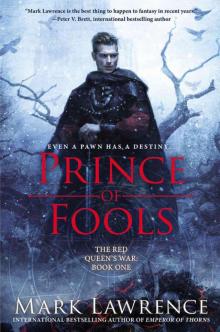 Prince of Fools
Prince of Fools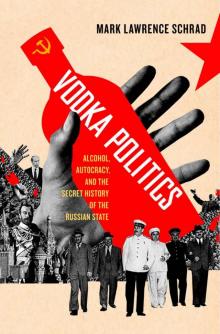 Vodka Politics: Alcohol, Autocracy, and the Secret History of the Russian State
Vodka Politics: Alcohol, Autocracy, and the Secret History of the Russian State Holy Sister
Holy Sister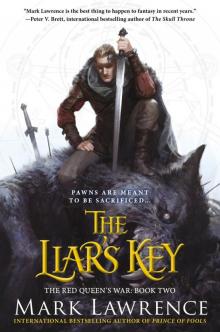 The Liar's Key
The Liar's Key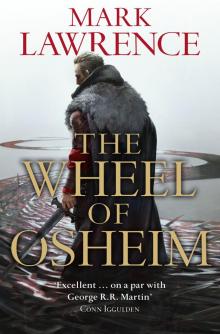 The Wheel of Osheim
The Wheel of Osheim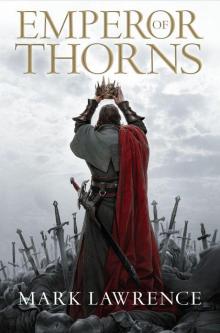 Emperor of Thorns
Emperor of Thorns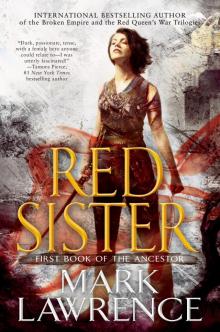 Red Sister
Red Sister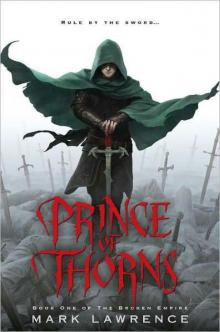 Prince of Thorns
Prince of Thorns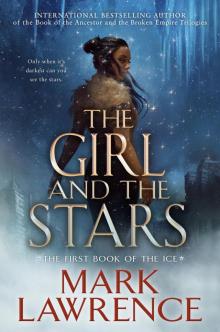 The Girl and the Stars
The Girl and the Stars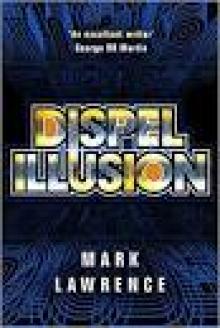 Dispel Illusion (Impossible Times)
Dispel Illusion (Impossible Times)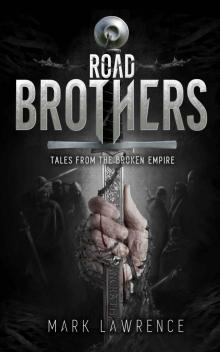 Road Brothers
Road Brothers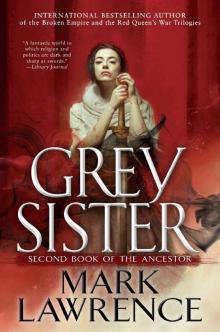 Grey Sister
Grey Sister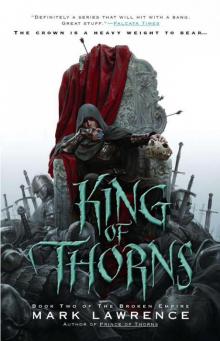 King of Thorns
King of Thorns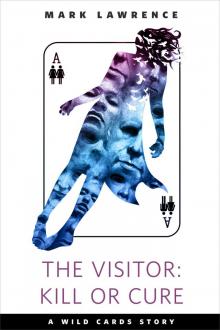 The Visitor--Kill or Cure--A Tor.com Original
The Visitor--Kill or Cure--A Tor.com Original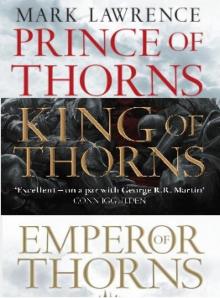 The Broken Empire Trilogy Omnibus
The Broken Empire Trilogy Omnibus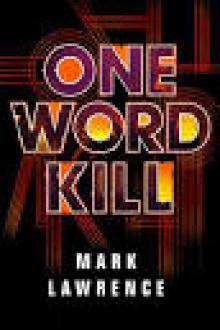 One Word Kill (Impossible Times Book 1)
One Word Kill (Impossible Times Book 1)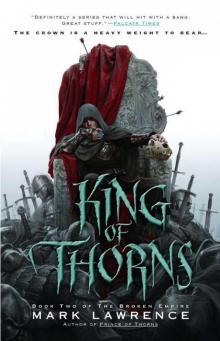 King of Thorns be-2
King of Thorns be-2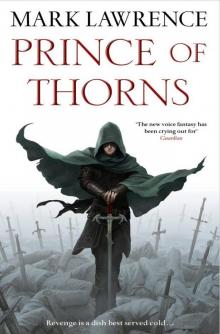 Prince of Thorns tbe-1
Prince of Thorns tbe-1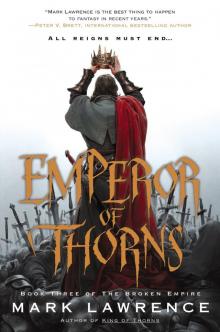 Emperor of Thorns tbe-3
Emperor of Thorns tbe-3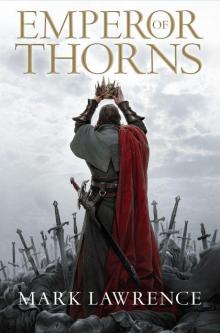 Emperor of Thorns (The Broken Empire, Book 3)
Emperor of Thorns (The Broken Empire, Book 3)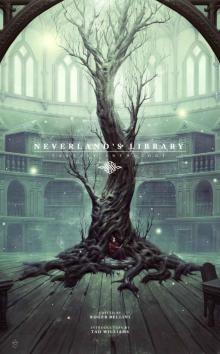 Neverland's Library: Fantasy Anthology
Neverland's Library: Fantasy Anthology